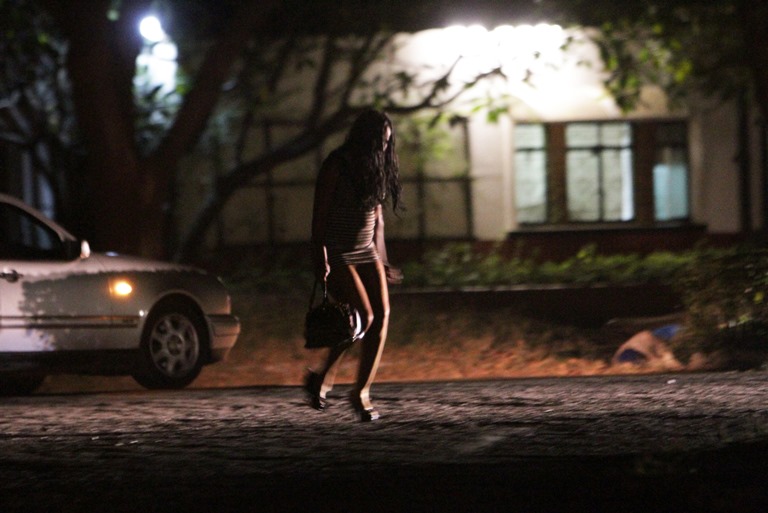This article originally appeared on the Women & Girls Hub of News Deeply, and you can find the original here. For important news about issues that affect women and girls in the developing world, you can sign up to the Women & Girls Hub email list.
By Sally Nyakanyanga
A recent case has shed light on the number of young women being trafficked from Zimbabwe to Kuwait. One woman tells of how, desperate for work, she ended up being sold to a family and trapped in a cycle of exploitation and abuse.
After finishing her secondary education, Hazvinei Garanowako had tried to find a job but with no luck. Instead, she found herself looking for menial tasks to make some money. Then a friend’s mother told Garanowako, now 24, that she could get her a job in Kuwait, with the visa costs and airfare paid for. “It was a relief to hear that the lowest I could be paid was $750 working in a hotel,” says Garanowako.
She left for Kuwait with dreams of finally moving out of the cramped one-room home she shared with her parents and two other siblings. But her hopes were short lived. When Garanowako arrived at the airport in Kuwait, she and some other African women were instructed to wait in a separate line at passport control. Then they were taken to a storeroom where they waited for more than 10 hours, she says. Eventually, a woman came and took Garanowako to a car waiting outside the airport.
“I was told harshly to get in as the woman exchanged money and my travel documents with an Arab man,” she says. She was taken to the man’s house and put to work as a housemaid, along with seven other women from the Philippines, Ghana and India. They worked 23 hours a day, serving the family and cleaning the 15-room house. Garanowako says if she stopped to take a break, the wife would beat her. She was forced to survive on leftovers that she secretly ate in the bathroom. “I had to lie to [the family] that I needed to take a bath so they would switch off the camera in the bathroom for me to eat,” Garanowako says. “If I didn’t do that, I was going to starve.”
A month into her ordeal, Garanowako managed to find a cellphone to call her mother, Evas Mututa. Mututa gave her daughter the address of the Zimbabwean embassy in Kuwait, but to get there, Garanowako first had to steal some clothes to disguise herself as a local. “Luckily, I found a taxi and managed to reach our embassy, which later helped me come back home,” she says.
The plight of young Zimbabwe women trafficked into servitude in Kuwait came to light recently, when Zimbabwe’s ambassador wrote a letter pleading with the government to tackle the issue.
Grey Marongwe, the Zimbabwean ambassador to Kuwait, wrote to Zimbabwe’s Ministry of Foreign Affairs in May, saying that the embassy was getting around 10 calls a day from Zimbabwean maids asking for help to escape their employees. “The maids issue has escalated to unprecedented levels,” said the letter. “From the 15 maids we reported in our first letter [dated October 2015], numbers have swelled to more than a hundred.”
According to Marongwe, unsuspecting job seekers are promised high salaries, free air tickets and free accommodation, only to realize on arrival in Kuwait that they have been sold into servitude. The maids have their passports confiscated and are forced to stay with their employers for at least two years.
After lobbying efforts from the embassy and various civil society organizations, the government has stepped in to help bring home 120 trafficking victims so far. Seven of the traffickers were arrested, and have since been released on bail.
Garanowako knows that, despite her ordeal, she’s one of the lucky ones. According to officials, there are more than 300 Zimbabwean girls who have been trafficked to Kuwait and are still trapped there. Zimbabwe, once the breadbasket of the region, is struggling to keep its people fed and employed. Severe drought – which the World Food Programme says will leave around 4.1 million Zimbabweans in need of food aid by January 2017 – a liquidity crunch, and high levels of unemployment and poverty have forced many to flee the country in search of jobs.
“Trafficking is a big issue, not only in Africa but globally,” says Lily Sanya, the International Organization for Migration (IOM) chief of mission in Zimbabwe. “It is a clandestine practice which has been made easy by globalization.”
The IOM has said forced labor is a global business worth $150 billion a year, and the International Labour Organization estimates that about 55 percent of trafficked victims are women, while 26 percent are children. Exact figures are hard to come by, but according to the U.S. Department of State 2016 report on trafficking in persons, Zimbabwean women are being lured to South Africa, China and the Middle East, among other countries. The report puts Kuwait on its Tier 2 watch list, meaning the state does not fully meet the minimum standards for the elimination of trafficking but is making significant efforts to do so. It reveals that domestic employees work on average 14 to 16 hours a day while employers retain 80 to 90 percent of the workers’ wages. Some Kuwait employers also monitor and confine the workers, who are often in poor health due to lack of adequate nutrition and healthcare, according to the report.
When Women & Girls Hub approached the Kuwait embassy in Zimbabwe for comment, we were told there was no one available to speak on the issue.
In March, former Kuwait ambassador to Zimbabwe Ahmed al-Jeeran was implicated as the ring leader in the trafficking syndicate that trapped Garanowako and other girls, accused of advertizing vacancies for non-existent nursing jobs in Kuwait in the local press. Jeeran was allegedly working with his secretary, Brenda Avril May, who is accused of being the contact person, as well as organizing airfare and visa arrangements, for trafficked women. Both Jeeran and May deny any wrongdoing.
Contacted by Women & Girls Hub for comment, May said, “I will not talk on that issue of trafficking,” and referred us to her lawyer. The cases of all those implicated are still pending in court, with possible sentences of up to two years in prison to be issued if they end in convictions.
While Zimbabwe has helped trafficking victims escape their dire situations, the women say support ends almost as soon as they get back home. When Garanowako returned to Zimbabwe, she spoke to a counselor the day she arrived, but has had no follow up since. She and the other women who were repatriated were given $100 and some groceries. Kindness Paradza, chairman of the Parliamentary Portfolio Committee on Foreign Affairs, says the government is working with partners such as the IOM to assist victims of trafficking to start income-generating projects.
But the negative impact of Garanowako’s experience in Kuwait is more complicated than an empty bank account. Her mother, Mututa, says that, ever since her daughter left for Kuwait, the family home has been wracked with distrust and conflict. “When I got news that the girls were trafficked to Kuwait, l was heavily traumatized,” says Mututa. “On the other hand, her father accuses me of leading Hazvinei into trafficking.”



